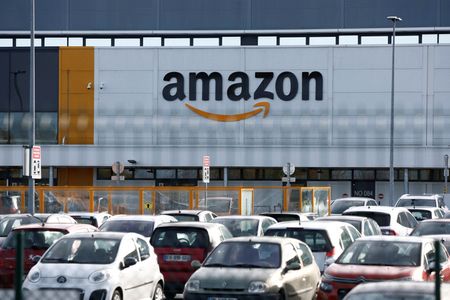By Mike Scarcella
(Reuters) – A lawsuit by the U.S. Federal Trade Commission against Amazon.com, expected to be filed as soon as this week, adds to a slew of legal challenges exposing the retail giant to billions of dollars in potential damages.
U.S. regulators have been probing Amazon.com and other Big Tech companies for antitrust violations and the FTC has long been expected to take formal action against the online retailer.
U.S. state and federal courts are grappling with cases relating to competition law that focus on Amazon’s pricing practices, fulfillment centers and the company’s relationships with major book sellers.
Here is a look at some of those cases.
CALIFORNIA, WASHINGTON D.C. ATTORNEYS GENERAL
California and District of Columbia attorneys general have sued Amazon.com over its product pricing policies, accusing it of unfairly barring merchants from offering lower prices on their own websites or at rivals such as Walmart, Target and Costco.
Washington, D.C.’s attorney general sued in May 2021, and California Attorney General Rob Bonta sued Amazon in September 2022. Last year, a District of Columbia superior court judge dismissed the district’s case, saying the city had not rebutted the contention that Amazon’s “prices are the result of lawful, unchoreographed free-market behavior.” The District’s appeal is pending.
In the California case, Judge Ethan Schulman in San Francisco Superior Court in March ruled against Amazon’s bid to dismiss the lawsuit. Schulman said California had shown as a threshold matter that Amazon’s policies “have had the anticompetitive effect of raising prices on competing retail marketplaces as well as on third-party sellers’ own websites.”
CONSUMERS’ PRICE INFLATION CLAIMS
Amazon faces a pair of consumer lawsuits in Seattle federal court. One accuses the retailer of artificially inflating prices on its platform, and the other alleges Amazon’s policies have pushed up the prices of goods sold elsewhere.
In March, U.S. District Judge Richard Jones ruled that Amazon must face consumer claims that its pricing practices artificially drove up the cost of goods sold by other retailers in violation of U.S. antitrust law. Jones’ ruling came in a prospective antitrust class action that has estimated damages of between $55 billion and $172 billion.
In the other consumer case, U.S. District Judge John Chun this month said in a ruling that the plaintiffs — five residents of California and Maryland who said they regularly shop using Amazon’s website — could advance their claims challenging Amazon’s pricing policies for goods sold on its site.
The consumer plaintiffs, Chun wrote, “allege the type of conduct that antitrust law is intended to prevent.” Amazon has denied the allegations in both cases and will have opportunities later to contest the merits of the claims.
FULFILLMENT CENTERS
A prospective class of consumers are pursuing claims they filed in 2021 in Seattle federal court that Amazon has tried to curb competition for shipping and fulfillment services, causing shoppers to pay more for purchases.
Amazon in April won an early victory, when U.S. District Judge Ricardo Martinez ruled that the plaintiffs had not shown why they should be allowed to sue over logistics practices — how and when a purchased item shows up at the buyer’s residence. Amazon argued that consumers do not purchase fulfillment services and cannot therefore sue over them.
The complaint, filed by two members of the annual paid subscription service Amazon Prime, said Amazon was unlawfully “tying” the sale of third-party products to the use of the company’s “Fulfillment by Amazon” program. The plaintiffs have refiled an amended legal challenge, and Amazon’s latest bid seeking dismissal of the case is pending.
E-BOOKS
In Manhattan federal court, a prospective class action from consumers accuses Amazon of artificially inflating the price of retail trade e-books on the site.
The lawsuit, filed in 2021, said Amazon had unlawfully barred the publishers from being able to offer their e-books for lower prices at other sites, including their own. “Prices for e-books have risen. Output has declined,” the consumers’ lawyers assert. “Consumer choice has been limited. Product innovation has been stunted.”
U.S. Magistrate Judge Valerie Figueredo in July recommended that certain claims move forward against Amazon but not the other defendants, five major book publishers. U.S. District Judge Gregory Woods has not yet ruled on objections from Amazon and the plaintiffs to Figueredo’s report and recommendation.
(Reporting by Mike Scarcella in Washington; Editing by Chris Sanders and Matthew Lewis)

